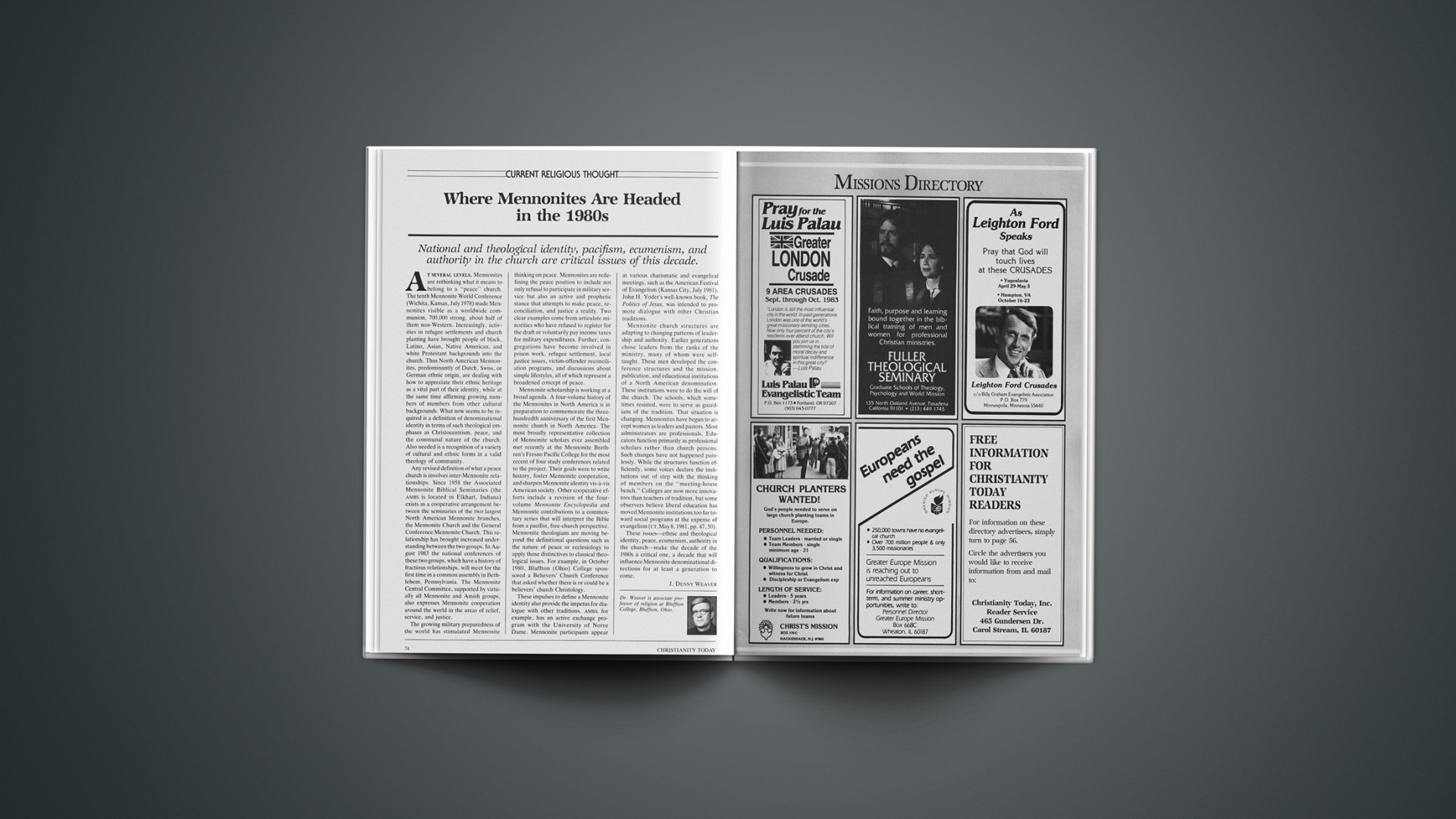National and theological identity, pacifism, ecumenism, and authority in the church are critical issues of this decade.
At several levels, Mennonites are rethinking what it means to belong to a “peace” church. The tenth Mennonite World Conference (Wichita, Kansas, July 1978) made Mennonites visible as a worldwide communion, 700,000 strong, about half of them non-Western. Increasingly, activities in refugee settlements and church planting have brought people of black, Latino, Asian, Native American, and white Protestant backgrounds into the church. Thus North American Mennonites, predominantly of Dutch, Swiss, or German ethnic origin, are dealing with how to appreciate their ethnic heritage as a vital part of their identity, while at the same time affirming growing numbers of members from other cultural backgrounds. What now seems to be required is a definition of denominational identity in terms of such theological emphases as Christocentrism, peace, and the communal nature of the church. Also needed is a recognition of a variety of cultural and ethnic forms in a valid theology of community.
Any revised definition of what a peace church is involves inter-Mennonite relationships. Since 1958 the Associated Mennonite Biblical Seminaries (the AMBS is located in Elkhart, Indiana) exists as a cooperative arrangement between the seminaries of the two largest North American Mennonite branches, the Mennonite Church and the General Conference Mennonite Church. This relationship has brought increased understanding between the two groups. In August 1983 the national conferences of these two groups, which have a history of fractious relationships, will meet for the first time in a common assembly in Bethlehem, Pennsylvania. The Mennonite Central Committee, supported by virtually all Mennonite and Amish groups, also expresses Mennonite cooperation around the world in the areas of relief, service, and justice.
The growing military preparedness of the world has stimulated Mennonite thinking on peace. Mennonites are redefining the peace position to include not only refusal to participate in military service but also an active and prophetic stance that attempts to make peace, reconciliation, and justice a reality. Two clear examples come from articulate minorities who have refused to register for the draft or voluntarily pay income taxes for military expenditures. Further, congregations have become involved in prison work, refugee settlement, local justice issues, victim-offender reconciliation programs, and discussions about simple lifestyles, all of which represent a broadened concept of peace.
Mennonite scholarship is working at a broad agenda. A four-volume history of the Mennonites in North America is in preparation to commemorate the three-hundredth anniversary of the first Mennonite church in North America. The most broadly representative collection of Mennonite scholars ever assembled met recently at the Mennonite Brethren’s Fresno Pacific College for the most recent of four study conferences related to the project. Their goals were to write history, foster Mennonite cooperation, and sharpen Mennonite identity vis-à-vis American society. Other cooperative efforts include a revision of the four-volume Mennonite Encyclopedia and Mennonite contributions to a commentary series that will interpret the Bible from a pacifist, free-church perspective. Mennonite theologians are moving beyond the definitional questions such as the nature of peace or ecclesiology to apply those distinctives to classical theological issues. For example, in October 1980, Bluffton (Ohio) College sponsored a Believers’ Church Conference that asked whether there is or could be a believers’ church Christology.
These impulses to define a Mennonite identity also provide the impetus for dialogue with other traditions. AMBS, for example, has an active exchange program with the University of Notre Dame. Mennonite participants appear at various charismatic and evangelical meetings, such as the American Festival of Evangelism (Kansas City, July 1981). John H. Yoder’s well-known book, The Politics of Jesus, was intended to promote dialogue with other Christian traditions.
Mennonite church structures are adapting to changing patterns of leadership and authority. Earlier generations chose leaders from the ranks of the ministry, many of whom were self-taught. These men developed the conference structures and the mission, publication, and educational institutions of a North American denomination. These institutions were to do the will of the church. The schools, which sometimes resisted, were to serve as guardians of the tradition. That situation is changing. Mennonites have begun to accept women as leaders and pastors. Most administrators are professionals. Educators function primarily as professional scholars rather than church persons. Such changes have not happened painlessly. While the structures function efficiently, some voices declare the institutions out of step with the thinking of members on the “meeting-house bench.” Colleges are now more innovators than teachers of tradition, but some observers believe liberal education has moved Mennonite institutions too far toward social programs at the expense of evangelism (CT, May 8, 1981, pp. 47, 50).
These issues—ethnic and theological identity, peace, ecumenism, authority in the church—make the decade of the 1980s a critical one, a decade that will influence Mennonite denominational directions for at least a generation to come.
J. DENNY WEAVER1Dr. Weaver is associate professor of religion at Bluffton College, Bluffton, Ohio.










